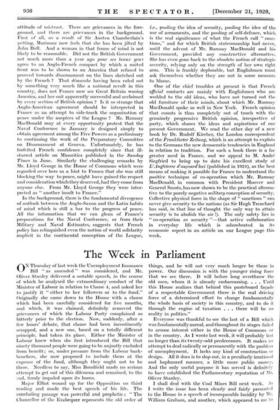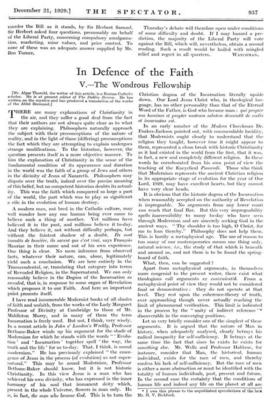The Week in Parliament
ON Thursday of last week the Unemployment Insurance Bill " as amended " was considered, and Mr. Oliver Stanley delivered a notable speech, in the course of which he analysed the extraordinary conduct of the Minister of Labour in relation to Clause 4, and asked her to justify it " either to her followers or to the fund." Originally she came down to the House with a clause which had been carefully considered for five months, and which, it was claimed, definitely removed the grievances of which the Labour Party complained so bitterly prior to the election. Now, suddenly, after a few hours' debate, that clause had been incontinently scrapped, and a new one, based on a totally different principle, had taken its place. Either the Minister of Labour knew when she first introduced the Bill that ninety thousand people were going to be unjustly excluded from benefit ; or, under pressure from the Labour back- benchers, she now proposed to include them at the expense of the fund, although they ought not to be there. Needless to say, Miss Bondfield made no serious attempt to get out of this dilemma and remained, to the end, firmly impaled upon its horns.
Major Elliot wound up for the Opposition on third reading and made the best speech of his life. The concluding passage was powerful and prophetic ; " The Chancellor of the Exchequer represents the old order of things, and he will not very much longer be there in power. Our discussion is with the younger rising force that we see there. It will before long overthrow the old men, whom it is already embarrassing. . . . Until this House realizes that behind this pasteboard façade of a respectable Government there is the real driving force of a determined effort to change fundamentally the whole basis of society in this country, and to do it through the engine of taxation , . . there will be no reality in politics."
Everyone was thankful to see the last of a Bill which was fundamentally unreal, and throughout its stages failed to arouse interest either in the House of Commons or in the country. As I wrote last week, it will probably last no longer than its twenty-odd predecessors. It makes no attempt to deal radically or permanently with the problem of unemployment. It lacks any kind of construction or design. All it does is to slop out, in a peculiarly irrational and haphazard manner, a little more public money. And the only useful purpose it has served is definitely to have established the Parliamentary reputation of Mr. Oliver Stanley.
I shall deal with the Coal Mines Bill next week. As I write the issue has been clearly and fairly presented to the House in a speech of incomparable lucidity by Mr. William Graham, and another, which appeared to me to murder the Bill as it stands, by Sir Herbert Samuel. Sir Herbert asked four questions, presumably on behalf of the Liberal Party, concerning compulsory amalgama- tion, marketing, mine values, and price control. To none of these was an adequate answer supplied by Mr. Ben Turner. • Thursday's debate will therefore open under conditions of some difficulty and doubt. If I may hazard a pre- diction, the majority of the Liberal Party will vote against the Bill, which will, nevertheless, obtain a second reading. Such a result would be hailed with mingled relief and regret in all quarters. WATCHMAN.



































 Previous page
Previous page